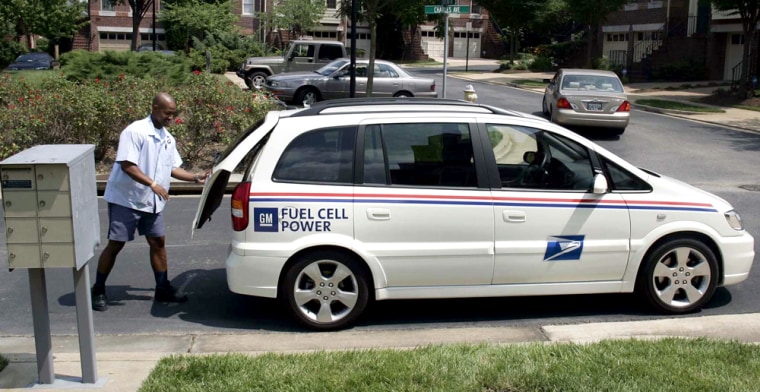General Motors has announced its first commercial application of fuel cell technology: a GM minivan that's being leased to the U.S. Postal Service for mail deliveries.
Used Tuesday for a test run in the Washington, D.C., area, the van will be in regular use starting in September, when the nation's first hydrogen pump at a retail gas station is set to open in the capital. That station is part of a GM and Shell Hydrogen partnership to provide hydrogen for a GM fleet of fuel cell vehicles operating around Washington.
Fuel cells run on the energy produced when hydrogen and oxygen are mixed, rather than using gasoline. The only byproduct of a fuel cell is water, but hydrogen must be extracted either from a fossil fuel or renewable energy. The latter is cleaner but much more expensive, at least so far.
'Perfect partner'
GM called the postal service "a perfect partner" for testing fuel cells because of the real-world conditions of its vehicle trips.
"The Postal Service operates everywhere in the U.S., giving us maximum flexibility to expand the relationship in areas or regions where a hydrogen infrastructure gets kicked off," Larry Burns, GM vice president of research & development and planning, said in a statement.
Mail delivery in local neighborhoods using a fuel cell vehicle will also help reassure the public about the safety of the technology, Burns said.
The path to fuel cells
President Bush last year announced a $1.2 billion initiative to transition to a "hydrogen economy" and Congress appropriated $159 million for 2004 towards that end.
DaimlerChrysler, Honda and Toyota have led carmakers in testing fuel cell technology, with each having leased several vehicles in recent years for real-world testing. Assuming obstacles can be overcome, sales of mass-produced fuel cell vehicles to consumers are not expected before 2010.
GM's other fuel cell applications include FedEx using a GM fuel cell van to deliver packages in Tokyo over the last year. And Dow Chemical is using a GM fuel cell to help power one of the world's largest chemical plants, located in Freeport, Texas.
The USPS, for its part, has been an early adopter of alternative energy. Its delivery fleet of more than 200,000 vehicles includes nearly 34,000 that run on alternative fuels. These include 6,439 running on compressed natural gas, 28 electric trucks, 35 liquefied petroleum gas vehicles and 27,471 powered by ethanol, a form of alcohol.
